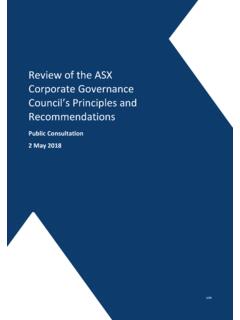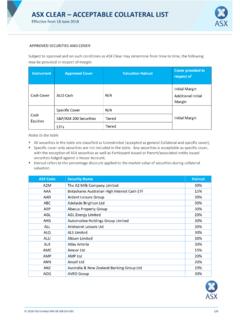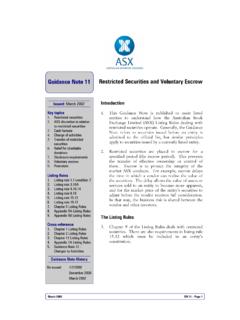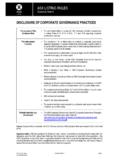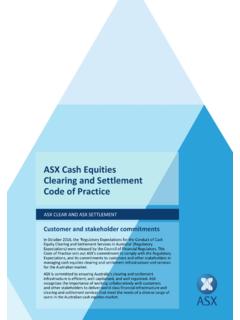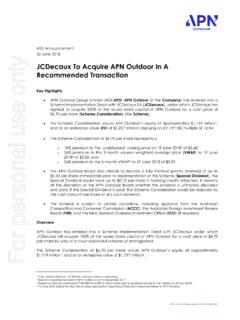Transcription of Corporate Governance Principles and Recommendations
1 ASX Corporate Governance Council Corporate Governance Principles and Recommendations 4th edition Consultation draft [Inside cover]. The 8 Principles 1. Lay solid foundations for management and oversight: A listed entity should clearly delineate the respective roles and responsibilities of its board and management and disclose how their performance is monitored and evaluated. 2. Structure the board to be effective and add value: A listed entity should have a board of an appropriate size, composition, skills, commitment and knowledge of the entity and the industry in which it operates, to enable it to discharge its duties effectively and to add value.
2 3. Instil the desired culture: A listed entity should instil and continually reinforce a culture across the organisation of acting lawfully, ethically and in a socially responsible manner. 4. Produce Corporate reports of high quality and integrity: A listed entity should have formal and rigorous processes to validate the quality and integrity of its Corporate reporting. 5. Make timely and balanced disclosure: A listed entity should make timely and balanced disclosure of all matters concerning it that a reasonable person would expect to have a material effect on the price or value of its securities.
3 6. Respect the rights of security holders: A listed entity should provide its security holders with appropriate information and facilities to allow them to exercise their rights as owners effectively. 7. Recognise and manage risk: A listed entity should establish a sound risk management framework and periodically review the effectiveness of that framework. 8. Remunerate fairly and responsibly: A listed entity should pay director remuneration sufficient to attract and retain high quality directors and design its executive remuneration to attract, retain and motivate high quality senior executives and to align their interests with the creation of value for security holders over the short, medium and longer term.
4 Table of Contents Foreword .. 1. About the Council .. 1. What is Corporate Governance ? .. 2. The purpose of the Principles and Recommendations .. 2. The basis of the Principles and Recommendations the if not, why not approach .. 2. The application of the Principles and Recommendations .. 3. The structure of the Principles and Recommendations .. 3. The linkage with ASX's Listing Rules .. 4. Where to make Corporate Governance disclosures .. 5. How to approach Corporate Governance disclosures .. 5. Disclosing the fact that a recommendation is 6. Disclosing the reasons for not following a recommendation.
5 6. Recommendations that are not applicable .. 7. Effective 7. Acknowledgments .. 7. Principle 1: Lay solid foundations for management and 8. Principle 2: Structure the board to be effective and add value .. 18. Principle 3: Instil the desired culture .. 25. Principle 4: Produce Corporate reports of high quality and integrity .. 30. Principle 5: Make timely and balanced disclosure .. 34. Principle 6: Respect the rights of security holders .. 36. Principle 7: Recognise and manage risk .. 40. Principle 8: Remunerate fairly and responsibly .. 45. The application of the Recommendations to externally managed listed entities.
6 51. Glossary .. 54. i Foreword The ASX Corporate Governance Council Principles and Recommendations ( Principles and Recommendations ) were first introduced in 2003. A second edition was published in 2007 and a third in 2014. In 2017 , the ASX Corporate Governance Council ( Council ) agreed that it was an appropriate time to commence work on a fourth edition of the Principles and Recommendations to address, among other things, emerging Governance issues around Corporate culture and social licence to operate. The fourth edition comes into force for financial years commencing on or after 1 July 2019.
7 I would like to express my appreciation to the Council for its work in maintaining the Principles and Recommendations as a world-leading standard on Corporate Governance by listed entities. Elizabeth Johnstone Chair, ASX Corporate Governance Council [Date] 2019. About the Council The Council was convened in August 2002. It brings together various business, shareholder and industry groups, each offering valuable insights and expertise on Governance issues from the perspective of their particular stakeholders. Its primary work has been the development of the Principles and Recommendations . The members of the Council are: Association of Superannuation Funds of Australia Limited ASX Limited Australasian Investor Relations Association Australian Council of Superannuation Investors Australian Financial Markets Association Australian Institute of Company Directors Australian Institute of Superannuation Trustees Australian Shareholders' Association Business Council of Australia Chartered Accountants Australia and New Zealand CPA Australia Ltd Financial Services Council Financial Services Institute of Australasia Governance Institute of Australia Group of 100.
8 Institute of Internal Auditors - Australia Institute of Public Accountants Law Council of Australia Property Council of Australia Stockbrokers and Financial Advisers Association Limited Further information about the Council, including a copy of its charter, is available at: 1. What is Corporate Governance ? The phrase Corporate Governance describes the framework of rules, relationships, systems and processes within and by which authority is exercised and controlled within corporations. It encompasses the mechanisms by which companies, and those in control, are held to account. 1. Good Corporate Governance promotes investor confidence, which is crucial to the ability of entities listed on the ASX to compete for capital.
9 The purpose of the Principles and Recommendations These Principles and Recommendations set out recommended Corporate Governance practices for entities listed on the ASX that, in the Council's view, are likely to achieve good Governance outcomes and meet the reasonable expectations of most investors in most situations. The Council recognises, however, that different entities may legitimately adopt different Governance practices, based on a range of factors, including their size, complexity, history and Corporate culture. For that reason, the Principles and Recommendations are not mandatory and do not seek to prescribe the Corporate Governance practices that a listed entity must adopt.
10 The basis of the Principles and Recommendations the if not, why not approach Which Governance practices a listed entity chooses to adopt is fundamentally a matter for its board of directors, the body charged with the legal responsibility for managing its business with due care and diligence2 and therefore for ensuring that it has appropriate Governance arrangements in place. Under the Principles and Recommendations , if the board of a listed entity considers that a Council recommendation is not appropriate to its particular circumstances, it is entitled not to adopt it. If it does so, however, it must explain why it has not adopted the recommendation the if not, why not.
